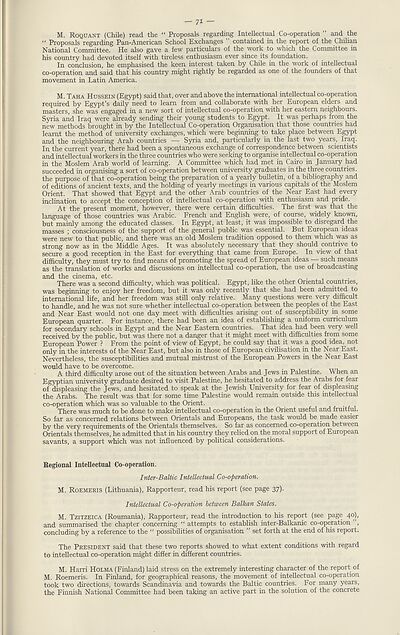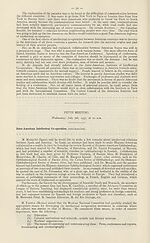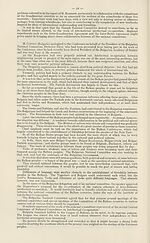International > Proceedings of the second General conference of national committees on intellectual co-operation, Paris, July 5th-9th, 1937
(73)
Download files
Complete book:
Individual page:
Thumbnail gallery: Grid view | List view

__ 7i —
M. Roquant (Chile) read the “ Proposals regarding Intellectual Co-operation ” and the
“ Proposals regarding Pan-American School Exchanges ” contained in the report of the Chilian
National Committee. He also gave a few particulars of the work to which the Committee in
his country had devoted itself with tireless enthusiasm ever since its foundation.
In conclusion, he emphasised the keen interest taken by Chile in the work of intellectual
co-operation and said that his country might rightly be regarded as one of the founders of that
movement in Latin America.
M. Taha Hussein (Egypt) said that, over and above the international intellectual co-operation
required by Egypt’s daily need to learn from and collaborate with her European elders and
masters, she was engaged in a new sort of intellectual co-operation with her eastern neighbours.
Syria and Iraq were already sending their young students to Egypt. It was perhaps from the
new methods brought in by the Intellectual Co-operation Organisation that those countries had
learnt the method of university exchanges, which were beginning to take place between Egypt
and the neighbouring Arab countries — Syria and, particularly in the last two years, Iraq.
In the current year, there had been a spontaneous exchange of correspondence between scientists
and intellectual workers in the three countries who were seeking to organise intellectual co-operation
in the Moslem Arab world of learning. A Committee which had met in Cairo in January had
succeeded in organising a sort of co-operation between university graduates in the three countries,
the purpose of that co-operation being the preparation of a yearly bulletin, of a bibliography and
of editions of ancient texts, and the holding of yearly meetings in various capitals of the Moslem
Orient. That showed that Egypt and the other Arab countries of the Near East had every
inclination to accept the conception of intellectual co-operation with enthusiasm and pride.
At the present moment, however, there were certain difficulties. The first was that the
language of those countries was Arabic. French and English were, of course, widely known,
but mainly among the educated classes. In Egypt, at least, it was impossible to disregard the
masses ; consciousness of the support of the general public was essential. But European ideas
were new to that public, and there was an old Moslem tradition opposed to them which was as
strong now as in the Middle Ages. It was absolutely necessary that they should contrive to
secure a good reception in the East for everything that came from Europe. In view of that
difficulty, they must try to find means of promoting the spread of European ideas — such means
as the translation of works and discussions on intellectual co-operation, the use of broadcasting
and the cinema, etc. ...
There was a second difficulty, which was political. Egypt, like the other Oriental countries,
was beginning to enjoy her freedom, but it was only recently that she had been admitted to
international life, and her freedom was still only relative. Many questions were very difficult
to handle, and he was not sure whether intellectual co-operation between the peoples of the East
and Near East would not one day meet with difficulties arising out of susceptibility in some
European quarter. For instance, there had been an idea of establishing a uniform curriculum
for secondary schools in Egypt and the Near Eastern countries. That idea had been very well
received by the public, but was there not a danger that it might meet with difficulties from some
European Power ? From the point of view of Egypt, he could say that it was a good idea, not
only in the interests of the Near East, but also in those of European civilisation in the Near East.
Nevertheless, the susceptibilities and mutual mistrust of the European Powers in the Near East
would have to be overcome.
A third difficulty arose out of the situation between Arabs and Jews in Palestine. When an
Egyptian university graduate desired to visit Palestine, he hesitated to address the Arabs for fear
of displeasing the Jews, and hesitated to speak at the Jewish University for fear of displeasing
the Arabs. The result was that for some time Palestine would remain outside this intellectual
co-operation which was so valuable to the Orient.
There was much to be done to make intellectual co-operation in the Orient useful and fruitful.
So far as concerned relations between Orientals and Europeans, the task would be made easier
by the very requirements of the Orientals themselves. So far as concerned co-operation between
Orientals themselves, he admitted that in his country they relied on the moral support of European
savants, a support which was not influenced by political considerations.
Regional Intellectual Co-operation.
Inter-Baltic Intellectual Co-operation.
M. Roemeris (Lithuania), Rapporteur, read his report (see page 37).
Intellectual Co-operation between Balkan States.
M. Tzitzeica (Roumania), Rapporteur, read the introduction to his report (see page 40),
and summarised the chapter concerning “ attempts to establish inter-Balkanic co-operation ”,
concluding by a reference to the “ possibilities of organisation ” set forth at the end of his report.
The President said that these two reports showed to what extent conditions with regard
to intellectual co-operation might differ in different countries.
M. Harri Holma (Finland) laid stress on the extremely interesting character of the report of
M. Roemeris. In Finland, for geographical reasons, the movement of intellectual co-operation
took two directions, towards Scandinavia and towards the Baltic countries. For many years,
the Finnish National Committee had been taking an active part in the solution of the concrete
M. Roquant (Chile) read the “ Proposals regarding Intellectual Co-operation ” and the
“ Proposals regarding Pan-American School Exchanges ” contained in the report of the Chilian
National Committee. He also gave a few particulars of the work to which the Committee in
his country had devoted itself with tireless enthusiasm ever since its foundation.
In conclusion, he emphasised the keen interest taken by Chile in the work of intellectual
co-operation and said that his country might rightly be regarded as one of the founders of that
movement in Latin America.
M. Taha Hussein (Egypt) said that, over and above the international intellectual co-operation
required by Egypt’s daily need to learn from and collaborate with her European elders and
masters, she was engaged in a new sort of intellectual co-operation with her eastern neighbours.
Syria and Iraq were already sending their young students to Egypt. It was perhaps from the
new methods brought in by the Intellectual Co-operation Organisation that those countries had
learnt the method of university exchanges, which were beginning to take place between Egypt
and the neighbouring Arab countries — Syria and, particularly in the last two years, Iraq.
In the current year, there had been a spontaneous exchange of correspondence between scientists
and intellectual workers in the three countries who were seeking to organise intellectual co-operation
in the Moslem Arab world of learning. A Committee which had met in Cairo in January had
succeeded in organising a sort of co-operation between university graduates in the three countries,
the purpose of that co-operation being the preparation of a yearly bulletin, of a bibliography and
of editions of ancient texts, and the holding of yearly meetings in various capitals of the Moslem
Orient. That showed that Egypt and the other Arab countries of the Near East had every
inclination to accept the conception of intellectual co-operation with enthusiasm and pride.
At the present moment, however, there were certain difficulties. The first was that the
language of those countries was Arabic. French and English were, of course, widely known,
but mainly among the educated classes. In Egypt, at least, it was impossible to disregard the
masses ; consciousness of the support of the general public was essential. But European ideas
were new to that public, and there was an old Moslem tradition opposed to them which was as
strong now as in the Middle Ages. It was absolutely necessary that they should contrive to
secure a good reception in the East for everything that came from Europe. In view of that
difficulty, they must try to find means of promoting the spread of European ideas — such means
as the translation of works and discussions on intellectual co-operation, the use of broadcasting
and the cinema, etc. ...
There was a second difficulty, which was political. Egypt, like the other Oriental countries,
was beginning to enjoy her freedom, but it was only recently that she had been admitted to
international life, and her freedom was still only relative. Many questions were very difficult
to handle, and he was not sure whether intellectual co-operation between the peoples of the East
and Near East would not one day meet with difficulties arising out of susceptibility in some
European quarter. For instance, there had been an idea of establishing a uniform curriculum
for secondary schools in Egypt and the Near Eastern countries. That idea had been very well
received by the public, but was there not a danger that it might meet with difficulties from some
European Power ? From the point of view of Egypt, he could say that it was a good idea, not
only in the interests of the Near East, but also in those of European civilisation in the Near East.
Nevertheless, the susceptibilities and mutual mistrust of the European Powers in the Near East
would have to be overcome.
A third difficulty arose out of the situation between Arabs and Jews in Palestine. When an
Egyptian university graduate desired to visit Palestine, he hesitated to address the Arabs for fear
of displeasing the Jews, and hesitated to speak at the Jewish University for fear of displeasing
the Arabs. The result was that for some time Palestine would remain outside this intellectual
co-operation which was so valuable to the Orient.
There was much to be done to make intellectual co-operation in the Orient useful and fruitful.
So far as concerned relations between Orientals and Europeans, the task would be made easier
by the very requirements of the Orientals themselves. So far as concerned co-operation between
Orientals themselves, he admitted that in his country they relied on the moral support of European
savants, a support which was not influenced by political considerations.
Regional Intellectual Co-operation.
Inter-Baltic Intellectual Co-operation.
M. Roemeris (Lithuania), Rapporteur, read his report (see page 37).
Intellectual Co-operation between Balkan States.
M. Tzitzeica (Roumania), Rapporteur, read the introduction to his report (see page 40),
and summarised the chapter concerning “ attempts to establish inter-Balkanic co-operation ”,
concluding by a reference to the “ possibilities of organisation ” set forth at the end of his report.
The President said that these two reports showed to what extent conditions with regard
to intellectual co-operation might differ in different countries.
M. Harri Holma (Finland) laid stress on the extremely interesting character of the report of
M. Roemeris. In Finland, for geographical reasons, the movement of intellectual co-operation
took two directions, towards Scandinavia and towards the Baltic countries. For many years,
the Finnish National Committee had been taking an active part in the solution of the concrete
Set display mode to:
![]() Universal Viewer |
Universal Viewer | ![]() Mirador |
Large image | Transcription
Mirador |
Large image | Transcription
Images and transcriptions on this page, including medium image downloads, may be used under the Creative Commons Attribution 4.0 International Licence unless otherwise stated. ![]()
| League of Nations > International > Proceedings of the second General conference of national committees on intellectual co-operation, Paris, July 5th-9th, 1937 > (73) |
|---|
| Permanent URL | https://digital.nls.uk/195218124 |
|---|
| Shelfmark | LN.XII |
|---|
| Description | Over 1,200 documents from the non-political organs of the League of Nations that dealt with health, disarmament, economic and financial matters for the duration of the League (1919-1945). Also online are statistical bulletins, essential facts, and an overview of the League by the first Secretary General, Sir Eric Drummond. These items are part of the Official Publications collection at the National Library of Scotland. |
|---|---|
| Additional NLS resources: |
|

